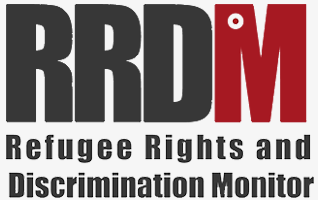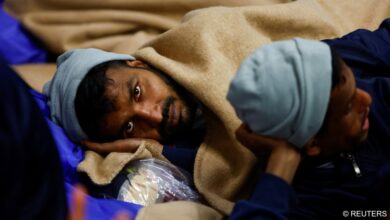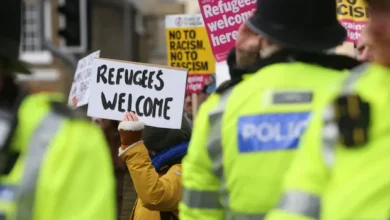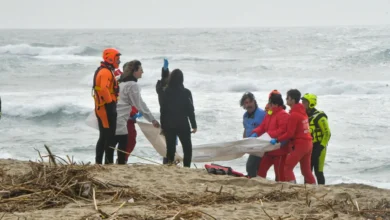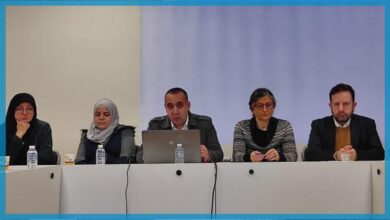Geo Barents races to save migrants despite Italy’s new law
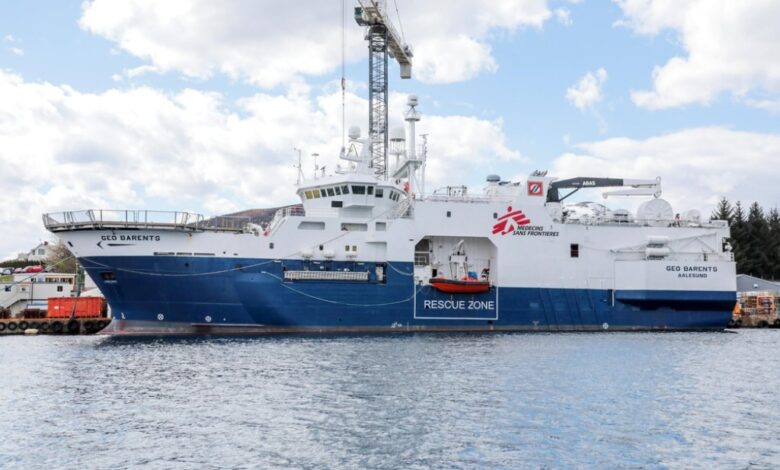
BY|infomigrants
The MSF rescue ship in the Mediterranean was racing to help a migrant boat in distress on Monday, but feared doing so might break the far-right Italian government’s new law on life-saving missions.
Doctors Without Borders (MSF), which operates the Geo Barents sea rescue ship, carried out a rescue operation on Monday morning (January 2) rescuing 41 people. Only hours later, the Italian coast guard had brought migrants on another sinking boat to safety after repeated appeals for help.
The Italian coast guard later requested assistance from MSF. The Geo Barents then took these passengers on board at the request of the Italian authorities.
Alarm Phone, a hotline used by migrants in distress, tweeted that it was “relieved to confirm that the Italian coastguard has eventually rescued” the people, who had first called for help on Sunday.
The new rules will cost lives
NGOs are now increasingly at risk of falling foul of the new decree signed into law in Italy on Monday, which aims at restricting the number of people being brought to shore by limiting the number of rescues charities are allowed make at any one time.
“We immediately requested permission from the Italian authorities to intervene, but received no reply,” MSF press officer Maurizio Debanne said. He also insisted, that the Geo Barents was not going off course to look for migrants, saying those in trouble were on its route to port.
The MSF team said its Geo Barents rescue ship would assist people in danger if it came across the boat in distress while it was en route to the port of Taranto, with passengers rescued on a previous mission.
MSF wrote on Twitter that “they were in danger of drowning in the waves. We managed to rescue everyone. But what would have happened without the GeoBarents?”
Criticizing the new decree imposed by the government on NGO ships, stating that this “risks limiting our operational capacity with an inevitable increase in the number of deaths.”
Other NGOs have also criticized the new measures warning of the human cost of limiting sea rescue operations.
Mirka Schaefer, advocacy officer of SOS Humanity, a German NGO which operates the rescue ship ‘Humanity 1’ in the Mediterranean told InfoMigrants that the new decree is “yet another attempt to prevent non-governmental rescue ships from their lifesaving work”.
“Any restriction of non-governmental rescue at sea means even more people will drown while fleeing to Europe,” she added.
MSF insists it is complying with the new rules
MSF published a series of tweets earlier Monday making it clear it was only aiding boats after being requested to by Italian authorities.
It also said on Twitter that Rome had asked the Geo Barents not to assist in one case, because the situation was “being managed by Libya” and that no assistance was needed from the MSF team.
Alarm Phone had previously alerted authorities to a boat in distress off the coast of Libya, stating on Twitter that they had since lost contact and fearing the boat’s forcible return to Libya.
The Geo Barents obeyed the instructions of the Italian authorities and began heading to the port of Taranto, with 85 rescued people on board. The journey is set to take about two days.
Forcing ships to travel to far away ports, as well as other measures, has a significant impact on the sea rescue process. Christiane Winje, press officer for MSF, told InfoMigrants that this “is clearly designed to keep rescue vessels out of the area where most distress cases occur for prolonged periods and reduce their ability to assist people in distress.”
She added that “NGOs are already overstretched due to the absence of a state-run SAR operation and the decreased presence of rescue ships will inevitably result in more drowning tragedies”.
Fears of falling foul of decree restrict rescues
Intervening in a second rescue operation could have potentially pitted the charity against the far-right government and its strict new decree law on rescues at sea. However, MSF later said it was no longer looking for the boat.
Debanne explained that if NGOs “perform the rescue without permission, Italy could theoretically say we have broken the new law”. But he also pointed out that “under international law and maritime conventions, we are obliged to assist those in danger”.
Rescues must be signed off on by Rome, which can even order charities not to assist people in distress, AFP reported
Speaking to InfoMigrants, Winje stated: “While we fully disclose all steps of our operations to the relevant authorities, we have documented many cases in which coastal states have…delayed rescues or the disembarkation of survivors in a safe place, which has inflicted additional suffering on these people.”
Adding “we will continue to work in full compliance with international law and ask European governments to do the same”.
Under the UN Convention on the Law of the Sea (UNCLOS), captains have a legal duty to render assistance people who are in danger, the new decree is making this increasingly difficult to uphold. It remains to be seen how NGOs continue to approach the new restrictions imposed by the Italian government.
Restrictions introduced by Italian far-right government
Italy’s prime minister Giorgia Meloni’s far-right government took office in October, vowing to stop migrant landings in Italy, which reached more than 105,000 in 2022, according to the interior ministry.
She claims migrants and people traffickers are encouraged by charities that rescue people that attempt the perilous sea crossing from North Africa.
However, NGOs say they always follow international and national laws regarding saving lives at sea, and slam the new rules as putting lives at risk.
Mirka Schaefer, advocacy officer of SOS Humanity, criticized the new rules for being contrary to international legal obligations. “No government and no national law can restrict the duty to rescue at sea as enshrined in international maritime law..”
Italian asylum lawyer Fulvio Vassallo Paleologo told AFP the new law introduced a system of “selective rescues” which “violates the primary value of safeguarding human life” enshrined in international law.
Most of the migrants who arrived in 2022 were rescued and brought to shore by Italian navy or coast guard vessels, not charity ships.
At least 20,218 people have died or gone missing on the crossing — the world’s deadliest — since 2014, according to the International Organization for Migration (IOM).
